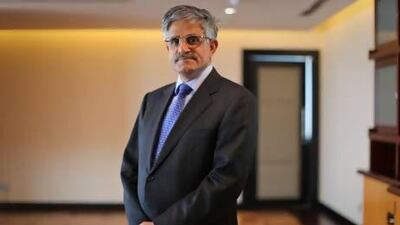One view of Bahrain is of a country, and an economy, in a rolling crisis since the outbreak of serious civil disturbance more than two years ago, with businesses packing up and leaving for safer havens further along the Arabian Gulf coast.
That is not at all a picture recognised or endorsed by Mahmood Al Kooheji, and he is in a position to know. As chief executive of the kingdom's sovereign wealth fund (SWF), Mumtalakat, he is at the heart of Bahrain's economy, controlling some of its biggest industrial and commercial assets.
"The figures tell the truth," he said recently on a visit to Dubai. "Just look at GDP growth. Even in the worst year, 2011, it grew by 2 per cent; last year it was 3.6 per cent, and the forecasts are for 5 per cent this year. That is not a picture of crisis."
That is true. However, much of the rise in growth reflects an increase in oil output after a drop last year caused by technical disruptions and slower onshore production.
On the supposed exodus of foreign firms, especially financial ones, from the troubled kingdom, he is equally dismissive. "We haven't really seen it all. Organisations like Citibank and BNP Paribas have actually increased their commitment to Bahrain.
"The fundamentals of Bahrain are strong. There is not much debt, and the private sector is still very active. The Saudi economy is doing very well, and we're very close to that," Mr Al Kooheji said.
He also pointed out that relief funds from fellow GCC countries - intended for investment in physical and social infrastructure after the disturbances - were finally coming through.
Nonetheless, he admitted that the unrest had a short-term effect, slowing growth, and in particular had a serious effect on Gulf Air, one of the bigger units in Mumtalakat's portfolio of companies.
The troubles, and the changing economic environment, had prompted a change of emphasis at Mumtalakat. Despite being one of the smaller SWFs in the region, with a comparatively modest US$7.1 billion worth of assets under management, many experts believed it would follow the typical Gulf SWF strategy of making investments outside the country to help diversify the national economy away from over-reliance on oil.
Mumtalakat was always in a slightly different position, however. With only about 35 per cent of the economy deriving from oil, he said, it was already somewhat diversified. Apart from oil, for example, its biggest export was aluminium, under the banner of Mumtalakat's Alba unit.
"We are still looking overseas, but are no longer actively searching for investments there. We'd only invest if the right thing comes along. It would be limited and very selective," he said.
The recovery in Bahrain's economic position, which has led some of the ratings agencies to upgrade their estimates of its and Mumtalakat's creditworthiness, has to some degree taken the pressure off Mr Al Kooheji.
There had been speculation he might sell some of the 40-odd companies in his portfolio, such as Alba or the telecoms group Batelco, but now that is not an imperative, he insisted.
"We don't have plans to dispose of any of them. Broadly, the portfolio companies fall into two main categories: those that are in high-growth businesses, and those that need restructuring," he said.
Included in the high-growth zone are Alba, where production has increased each of the past two years despite the unrest in the country; and Batelco, which recently expanded its international operations with a $1bn deal with Cable & Wireless of the United Kingdom.
Other growth areas are in food manufacturing and retailing, construction and tourism, Mr Al Kooheji said.
The biggest concern in the category marked "need for restructuring" remains Gulf Air. The airline was suffering anyway from the rapid expansion of cash-rich rivals in the region such as Qatar Airways, Etihad and Emirates. The disturbances that broke out in early 2011 further affected the numbers of people travelling to Bahrain.
"There was a need to right-size the airline, and this has been achieved. We now have 26 planes, and a selective list of destinations that help to service the economy in Bahrain," he said.
Airline losses of about 100 million dinars (Dh974m) this year will be borne by the Bahrain government, and are due to fall to 75m dinars next year, although no break-even stage is yet foreseen.
Gulf Air aside, much of the Mumtalakat portfolio is in expansion mode. Mr Al Kooheji has earmarked some $150m for investment in new projects this year, mainly in construction of tourism facilities, improvements to the Formula One racing track, and an injection of equity into downstream projects at Alba.
"The Bahrain economy is changing, and we are a catalyst for that change," he said.
There have been calls for greater transparency in the kingdom's decision-making process over the past couple of years, and Mumtalakat seems to be working hard towards that end in the corporate sector.
"Transparency and good governance are in our DNA," said Mr Al Kooheji.

